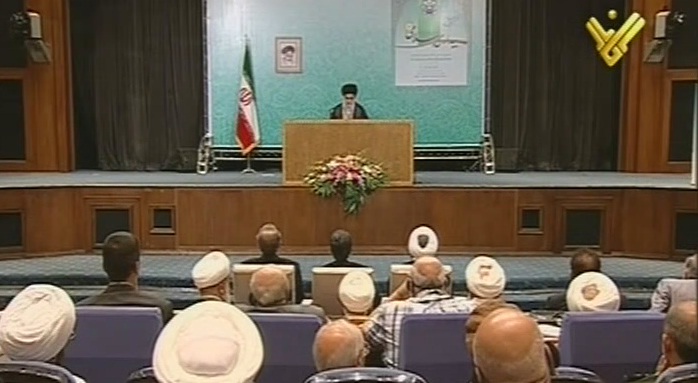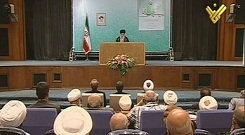Iran inaugurated Saturday the first conference on the Islamic Awakening, which over 700 intellects and scholars from 80 countries attended.
Iran inaugurated Saturday the first conference on the Islamic Awakening, which over 700 intellects and scholars from 80 countries took part in.
The conference that was held in Tehran will continue for two days and will include the discussion of five main topics that are, the basics and concepts of the Islamic awakening, the roles that influential people played in it, an introduction to the movements that had roles in this awakening, a study on the threats that face the Islamic awakening, and closing its ranks.
 Leader of the Islamic Republic of Iran Grand Ayatollah Sayyed Ali Khamenei was the first to deliver a speech in the conference, in which he assured that this Islamic development cannot be separated from its historical roots, and that it was not a wave that suddenly erupted.
Leader of the Islamic Republic of Iran Grand Ayatollah Sayyed Ali Khamenei was the first to deliver a speech in the conference, in which he assured that this Islamic development cannot be separated from its historical roots, and that it was not a wave that suddenly erupted.
Imam Khamenei said that “what united us is the Islamic awakening… the uprising and awareness that is spreading in the Islamic nation, which led to revolts in the region.”
His Eminence talked about three main points that are the revolutions themselves, the dangers standing in their way, and steps to deal with them, and indicated that all the attempts by the West to make the revolutions just temporal movements are useless, reassuring that the acts against Iraq and Afghanistan where an introduction to the Islamic uprising against arrogance.
Imam Khamenei further assured that the major element in these revolutions was its popularity and the permanent effective presence in the field of work and jihad, indicating that determination that was present in the Egyptian, Tunisian and Yemeni people will follow the same track in Bahrain, and that the legitimacy of these revolutions was the major element in forming their identity.
Imam Khamenei reminded that what Iran witnessed in the 70s was a great revolution that was similar to the victory of the blood over the sword, and formed a firm establishment of the Islamic system, and pointed out that "we have always expected that Egypt will be the first to revolt, due to our knowledge about Egypt's wide jihadi and cultural history, and the great and historic characters that it had produced."
In parallel, his Eminence said that the Eastern camp has collapsed, the Western one was trying stay firm, and the Islamic awakening is the one that will triumph.
He considered that any fear from the United States and the West is a danger that must be treated and confronted , and should not be present in the hearts of the youth in the Islamic world… “This generation in the Islamic countries has the capability to rise and confront, something that we should be proud of.”
“It is possible to overpower all these obstacles, by relying on Allah and having determination and courage,” Imam Khamenei added, emphasizing that “the slogans of the Islamic revolutions should stress on independence, dignity, and rejection to the Zionist entity… the goals of the Islamic awakening do not suit the Western, and the Zionist entity’s interests.”
As for the situation in Libya, Imam Khamenei said that the American and Western intervention in Libya had caused the death of many and the destruction of infrastructures. He stressed that the Libyan people are the only ones who have the right to draw victory for themselves, and that those who supported Mouammar Gaddafi in the past sould not interfere in the future of Libya.
Various speakers also delivered speeches during the first day of the conference including head of the Sudanese Popular Conference Party Hasan Turabi, Hezbollah Deputy Secretary General Sheikh Naim Qassem, Leader of the Islamic Jihad movement in Palestine Ramadan Abdullah Shallah, and Former Afghan President Burhanuddin Rabbani.
